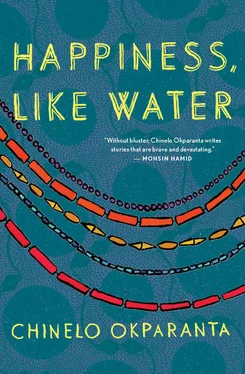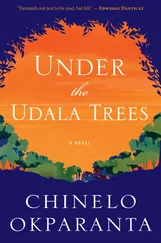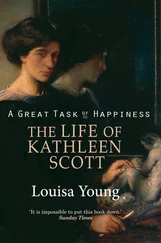There is a couple sitting by the window. They are wearing hats, and they have muffled themselves up with oversized scarves that appear more like cloaks. Then he removes his hat and removes his cloak, and she does the same. He smiles at her, reaches out and stirs the contents of her cup while she is still struggling to take off her gloves. Their hands come together, his dark on her fair skin, and I think of Grace, and I imagine Nwafor putting his hand on her. And then the woman takes her cup, takes a sip out of it, and she laughs at something he says. She looks happy, and I find myself hoping that Nwafor will make Grace happy like that. So long as she is happy, I say to myself. And I find myself trying hard to remember if I’ve ever heard of or read about or watched any stories in which an arranged marriage ends up being successful. Of course the only examples that come to my mind are from the Bible. I think of Isaac, how Abraham asks his servant to go find a wife for him. And that woman ends up being Rebekah. And the servant asks her father for permission to take Rebekah back home to Isaac. And her parents give the permission. She does not know what Isaac looks like, neither does Isaac know what she looks like. And yet the marriage ensues and for all intents and purposes appears to be a success. Of course, the big difference is that Rebekah agrees to marry Isaac.
‘Will you go with this man?’ they ask her.
‘I will go,’ she says.
Just a few days before Christmas, my daughter calls me from Massachusetts, tells me that because of a mix-up in plans, they will be spending this Christmas with her in-laws, that they will no longer be coming down to be with me. It’s been this way since my grandson was born, three Christmases now, and each time she comes up with a similar excuse. She tells me it has to be done because her husband’s family will be very upset if they don’t make it.
‘What about me?’ I ask.
She says, ‘Mom, it’s just you. He’s got the whole family, brothers, sisters, aunts, uncles, cousins. They’ll all be angry with me. Please understand,’ she says. ‘I’ll make it up to you. In the meantime, better for one person to be mad at me than the whole gang.’
I tell her fine, that I anyway have research to do and lectures to prepare. And the truth is that I’d much rather not be dealing with the chaos of family Christmases, all those people gathered in one small space, and not in an orderly fashion, as in a lecture hall. Still, it’d be nice to bake pies and prepare the meal together, to chit-chat and catch up as we do. It’d also be nice not to have to eat alone, because these days, maybe as a result of the Christmas season, or the cold weather, I’m feeling lonelier than ever, and eating has begun to feel like a chore, a solitary task without any enjoyment in it. Even so, I tell my daughter, ‘Fine.’ She thanks me hastily and hangs up the phone.
I immerse myself in work the entire break, but between the research and the preparation for lectures and conferences, I find myself thinking of Grace. I think of the feel of her braids on my skin and of her smile. I remember her collared dress and her musty perfumed scent. And every now and then there is a feeling of dread when I think of the possibility that she will be a married woman the next time I see her.
The New Year arrives, and then a week later, classes resume. The first week, I don’t see Grace. The second week, I’m sure she will show up, but she doesn’t. I begin to mope about. Every passing day becomes a great disappointment, though there are those brief moments of hope, moments where I find myself recognizing Grace’s features in another young woman. But then the young woman turns around and I see that it’s not her. And I’m left feeling even emptier than before.
The third week, sitting in my office, flipping through the pages of the New Testament, I hear the knock. She enters without my inviting her in. I’m expecting that she will head straight to one of the two empty seats. Instead she stops near me. My front is facing my desk, and my back is to her, so she simply hugs me from behind before taking a seat. She apologizes for being gone all this time, for returning so late into the semester. She asks me if I had a good Christmas break, and all I can do is nod.
She stretches out her hand to stroke my arm. ‘I’m sorry,’ she says. Maybe the look on my face somehow tells her how miserable I’ve been.
I look down at my arm, at her hand on it. She retracts it, shyly, as if she’s suddenly aware of an indiscretion. I want to tell her that I’ve been thinking of her, but instead I find myself saying, ‘Are you married now?’
She looks curiously at me, and for a moment I feel as if I am trespassing, as if the question is not mine to ask. But her curious glance quickly fades away, and she shakes her head and tells me ‘No,’ but that soon she will be. This time it is I who reaches out and strokes her arm.
‘It’s okay,’ she says. ‘It’s not the end of the world.’
‘Isn’t it?’ I ask, wanting her to tell me that it is in fact the end of the world, wanting her to begin crying so that I can hold her again.
She shakes her head. She says, ‘No.’ Then she clears her throat. ‘I’d like you to come,’ she says.
‘To your wedding?’ I ask.
She nods.
I shake my head and tell her I can’t. That I’ll probably be at a lecture somewhere. But that even if I weren’t, there’d be no reason for me to attend her wedding, given that I’m just her professor.
‘Really?’ she asks.
‘Really,’ I say, forcing myself to stick to the excuse.
We both stare at each other for some time. Neither of us speaks. Then she says, ‘I was in Nigeria over the break.’
‘Really?’ I ask.
She nods.
She tells me how it was sort of in preparation for her own wedding, because her cousin Ogechukwu was getting married, and her mama wanted her to attend the wedding ceremonies — the traditional and the white — to remind her first-hand how authentic Nigerian weddings were done, so that she would know what was expected of her in her own wedding.
She stops there, and when she doesn’t continue, all I can think to ask is whether or not her brother or her mother went with her.
She nods. ‘Mama went with me,’ she says. ‘Not Arinze,’ she says. Because, she tells me, according to her Mama, Arinze already knew the culture, already knew what it meant to be Nigerian. It was she who caused her mama some concern.
She tells me her mama is right. That sometimes she barely feels Nigerian, which she knows has never been the case with Arinze. Growing up, Arinze was always speaking Igbo with her mama while she could only understand and respond in English. Arinze would always swallow his balls of garri after dipping them into the soup. She, on the other hand, chewed hers. Arinze knew the Igbo names of all the food items they sold in the store, from the crayfish to the oils to the seeds. He could differentiate the egusi from the ogbono. She could not. And, of course, there was the time that Arinze told Mama that he would find himself a good Igbo girl and marry her. He was much younger then, she says, and she laughs a dry, sarcastic laugh. She tells me that perhaps he has changed his mind by now. But even as far back as then, she says, she had no desire to marry a man, much less a Nigerian man she’d never actually met.
‘Did you finally get to meet him, then?’ I ask.
She nods but doesn’t say any more about it. Instead she tells me that she and her mama only stayed a week. They helped to prepare the food for the wedding, pots of egusi soup, okra soup, jolloff rice, fried fish and of course, the ishi ewu delicacy — fried goat head in pepper soup.
They helped to fit Ogechukwu’s outfits, too, pinning the sides of the wrappers and the white wedding gown, picking out the beads of her necklaces and the beads of her jigida — her waist beads — which were numerous, about fifteen sets all together, all of different colours. They measured the jigida, fitted them, because she would wear them as she danced, and they would jingle, and onto them money would be stuck. But if they were not correctly fitted, the jigida would start to descend down Ogechukwu’s buttocks, down her thighs, with all the dancing that she would do that day, and all the money would drop with them.
Читать дальше












